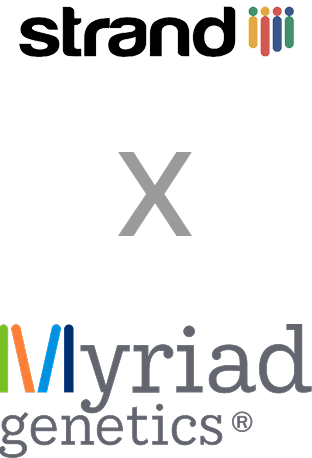
The Future of
Bioinformatics
with






The Future of
Bioinformatics
with






Co-organized with Bay Bifx!
Find out how automation and AI are streamlining bioinformatics workflows, from accelerating single-cell metadata curation to building scalable, cost-effective NGS infrastructures. Co-hosted by Myriad Genetics and Strand Life Sciences, this event brings together shared expertise in genomics, bioinformatics, and clinical diagnostics.
Talk Details
Talk Details
Moderator

Jaya Singh
Associate Vice President, Strand Life Sciences

Unlocking Advanced Protein Manufacturing Using Systems Engineering
Romel Menacho Melgar
CEO of Roke Biotechnologies
Roke Biotechnologies has developed a systems engineering protein manufacturing platform in E. coli that enables advanced capabilities in protein expression and purification. By decoupling growth from production, the platform delivers standardized, scalable bioprocesses and an autolysis strain that works without tuning across diverse workflows, from high-throughput screening to in-bioreactor purification. Freed from growth-associated boundary conditions, we have also developed advanced tools that drive robust expression of hard-to-express proteins, establishing a versatile foundation for next-generation biomanufacturing
Watch Romel Menacho-Melgar discuss engineering precision into protein manufacturing

Automated Metadata Ingestion and Harmonization in Strand’s scRNA-seq Portal and Beyond
Badri Padhukasahasram
VP of Data Science, Strand Life Sciences
Harnessing and standardising metadata from public repositories (like NCBI’s GEO, CellxGene, ArrayExpress etc) can help unlock its potential for a range of research questions. We have developed an automated system based on Retrieval Augmented Generation (RAG) and Large Language Models (LLM) to quickly and accurately (> 95% on average) standardize biomedical terms from real world paragraphs to standard ontologies. Performance of this pipeline is demonstrated on manually curated ground truths from Strand’s scRNA-seq portal and provides ~3x improvements in turn around time compared to manual curation. The LLM pipeline also provides reliable metrics of quality to enable curators to prioritize manual followup checks and correction.
Watch Badri talk about automating metadata harmonization with AI

Master Infrastructure Set Up for Multiple Pipeline Integrations in Minimal Residual Disease (MRD)




This talk will outline the challenges in bioinformatics workflows and our solutions for simplifying day-to-day tasks. It will cover the Strand-Myriad collaboration, which has resulted in a master infrastructure setup, including an ICA computational system using DRAGEN, DNAnexus integration with S3, and configuration of ICA projects for storage on S3, for the easy execution of the complete pipeline.
This infrastructure solution, which facilitates integration with S3 and configuration of analysis pipelines, has resulted in significant cost reductions in terms of storage and computation time, as evident in the MRD assay.
Overall, the audience will take away important strategies for reducing costs, cloud storage, and computation time, as these are essential for the successful launch of production-ready NGS tests.
Explore how experts built a unified infrastructure to power multiple data pipelines

Genetic Algorithms For High Dimensional Feature Refinement
Kyle R Covington
Director of Bioinformatics, Castle Biosciences Inc
High-throughput biological assays frequently generate extensive feature spaces, posing challenges for downstream analysis, assay cost, and interpretability. Here, we present a versatile framework that employs genetic algorithms (GAs) for constrained feature selection in bioinformatics workflows. This approach evolves compact feature subsets optimized for both predictive performance and practical deployment. We demonstrate how hybridizing GAs with neural network–based predictive modeling can be used to generate robust predictive algorithms that can be deployed within laboratory assay constraints. Key implementation considerations and strategies for preventing overtraining are discussed. This work underscores the utility of GAs as generic optimizers in bioinformatics and provides best practices for their integration into feature‐selection tasks where technical and operational constraints are paramount.
Watch Kyle R. Covington discuss high-dimensional feature optimization with genetic algorithms
Resources
Resources
Single Cell Data Harmonization
Pharma and Biomarker Discovery Applications
07
Methylomics

Our
Get to Know the Teams Behind the Science
Get to Know the Teams Behind the Science

01
Myriad Genetics
Myriad Genetics is a leading molecular diagnostics company advancing precision medicine through innovative genetic testing. By developing molecular tests that assess disease risk, progression, and treatment response, Myriad provides actionable insights that guide personalized care. Focused on improving outcomes, reducing costs, and enabling earlier, more accurate diagnoses, Myriad is helping shape the future of healthcare.

02
Strand Life Sciences
Strand Life Sciences is a global genomics and bioinformatics company focused on multiomics research and diagnostics. Founded in 2000, it offers services including targeted panels, variant curation, data analysis, and software development to leading diagnostic, instrument and pharmaceutical companies. With teams in India and the U.S., Strand brings together cross-disciplinary expertise to advance precision medicine.



